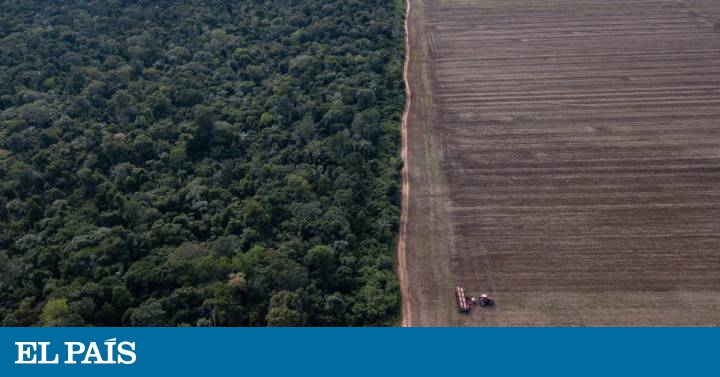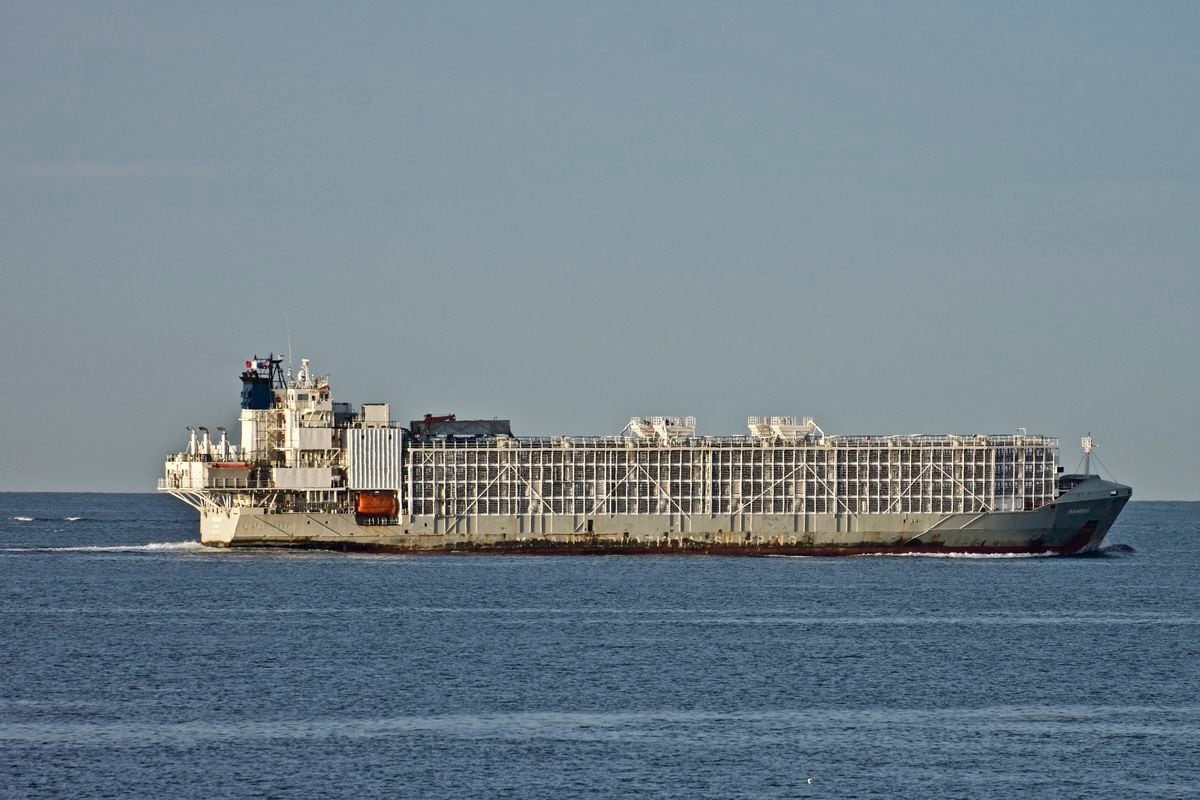1Operators in a soybean processing plant in Sinop, Mato Grosso, Brazil.
This region is the heart of Brazilian agribusiness, the only economic sector that grew in 2020 despite the pandemic.
Victor moriyama
2A worker next to an immense mountain of soybeans stored on the outskirts of the city of Sinop, a region that is the cradle of agribusiness and a thriving entrepreneurial class.
Victor moriyama
3Soya stored on the outskirts of the city of Sinop (Mato Grosso) before being loaded onto trucks that will take it along the BR-163 highway to the Tapajos River, a tributary of the Amazon.
From there it will be taken to China or the European Union.
Victor moriyama
4An operator works between two containers of soybeans in a processing plant on the outskirts of Sinop, a city founded in the 1970s in Mato Grosso thanks to the incentives of the dictatorship to colonize the Amazon.
Victor moriyama
5Processing of soybeans in Sinop.
Producers work well ahead of time, with little labor and a lot of technology, which has allowed them to better weather the effects of the virus.
Victor moriyama
6 An operator weighs and analyzes a soybean sample at a processing plant in Sinop.
An auditor from the KPMG company that works for Bayer Monsanto analyzes the grain and, if it is transgenic, takes notes to collect the patent rights from the producer.
Victor moriyama
7Several workers unload a truck of soybeans, just arrived from a farm.
Once weighed and processed, it will be loaded into another vehicle to be transported to a port.
The locals are pleased that President Bolsonaro has paved the 175 kilometers that were missing so that the 900 kilometers of the BR-163 highway will be passable throughout the year.
Victor moriyama
8 An operator in a soybean processing plant.
Victor moriyama
9Several workers observe the heavy downpour of rain one afternoon in March at a soybean processing plant.
Victor moriyama
10A replica of the Statue of Liberty presides over the entrance to the Sinop branch of the Havan department store, owned by a friend of President Bolsonaro.
The famous New York symbol is a hallmark of the stores.
Victor moriyama
11A road inside the Minuano farm, located on the outskirts of Sinop.
On the left, a crop;
on the right, part of the vegetation that by law must be preserved.
With 5,100 hectares, their main crop is soybeans, but they also plant corn, rice and beans.
Victor moriyama
12Aerial view of a plot ready for cultivation next to a strip of vegetation on a farm in Sinop.
As it is located in the Amazon, the law requires that the vegetation of 80% of each rural property be preserved.
It can only be cultivated in the remaining 20%.
Producers, the government and NGOs reached an agreement years ago whereby the former pledged not to farm on illegally deforested land.
Victor moriyama
13The husband of the head of the farm Minuano (in red) analyzes the land while being observed by an operator in March.
Victor moriyama
14The farms in this Brazilian region are highly technical, which has allowed them to better overcome the effects of the coronavirus epidemic.
Victor moriyama
15A tractor at the Minuano farm, located on the outskirts of Sinop.
In the background, a crop and one of the vegetation plots that the law requires to preserve in this area of Amazonia.
Only 20% of the property is arable area.
Victor moriyama
16 Soybean processing in the Sinop region, the heart of the soybean industry in Brazil.
Victor moriyama
17The silo built a few years ago at the Minuano farm, which sells its production for export.
Agribusiness is one of the most important economic sectors for Brazilian foreign trade.
Victor moriyama
18Installations for the production of soybeans on a farm on the outskirts of Sinop.
In recent years, the soy industry has created a thriving business class in Brazil.
Victor moriyama
19Aerial view of a silo at the Minuano farm in Sinop.
With 5,100 hectares for crops, it produces soybeans but also corn, rice and beans.
Farms in this area usually produce two, three and up to four crops a year thanks to intensive use of the land, transgenic seeds and pesticides.
Victor moriyama
20Tamires Vasconcelos, a 35-year-old agricultural engineer, poses in a soybean field. He has been in the sector for two decades and runs the family ranch, Minuano, located on the outskirts of Sinop. His father came to the region in the 1970s as part of the colonizing movement that cleared this area of the Amazon to build roads and cities. Victor moriyama
Trip to the world of soy in Brazil
2021-04-24T18:16:11.694Z

Bolsonarista territory and cradle of a thriving business class. The only cloud on its horizon is pressure from environmentalists and Europe





/cloudfront-eu-central-1.images.arcpublishing.com/prisa/UYB5LX3DDBAQTJNDI5EKYZLHEM.jpg)

/cloudfront-eu-central-1.images.arcpublishing.com/prisa/RSVSTQFDNZHWVNNUYWZ2MAMOUE.JPG)






